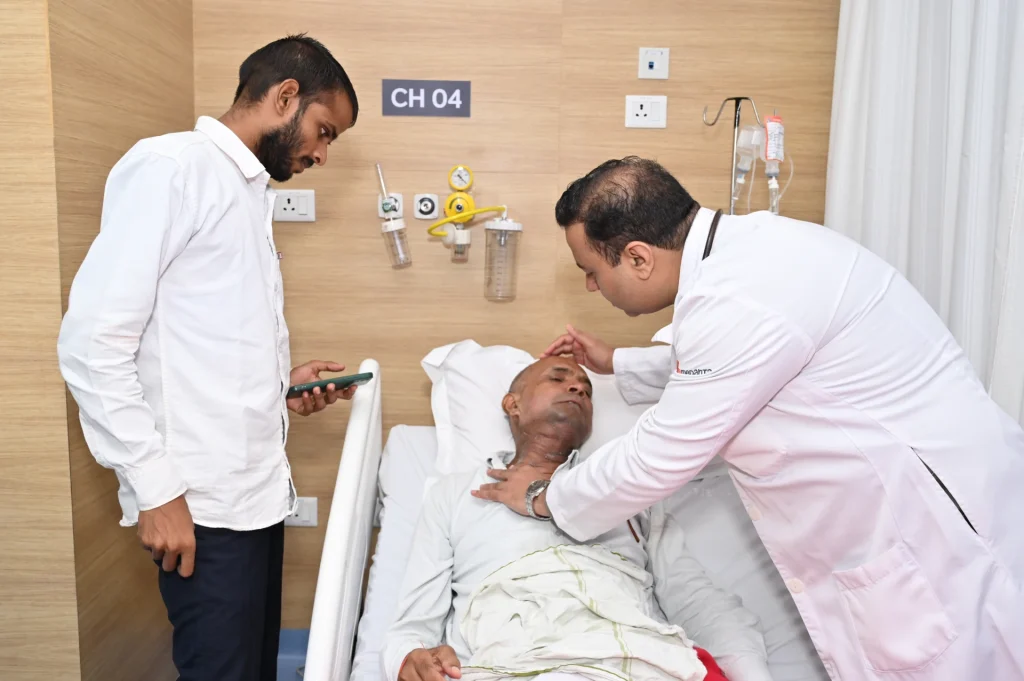- CANCER HELPLINE: 1800-22-1951
- 91 7317418888
- contact@drharshatreya.com
- CANCER HELPLINE: 1800-22-1951
carousel-slider domain was triggered too early. This is usually an indicator for some code in the plugin or theme running too early. Translations should be loaded at the init action or later. Please see Debugging in WordPress for more information. (This message was added in version 6.7.0.) in /home/locaqain/public_html/drharshatreya/wp-includes/functions.php on line 6131Basal cell skin cancer (BCC) is the most common type of skin cancer, and although it is rarely life-threatening, it can cause significant damage to the skin and surrounding tissues if left untreated. BCC originates in the basal cells, which are located in the deepest layer of the epidermis (the outer layer of the skin). It typically appears in areas that are frequently exposed to the sun, such as the face, neck, ears, scalp, chest, back, and arms.

The symptoms of basal cell carcinoma are often subtle and may be mistaken for other skin conditions. Common signs include:
A Pearly or Waxy Bump: BCC typically starts as a small, raised, shiny, or pearly bump on the skin, often with visible blood vessels (telangiectasia).
A Flat, Flesh-Colored or Brown Scar-like Area: Some BCCs appear as flat, scaly patches that are flesh-colored, brown, or dark, and may have an irregular edge.
Ulceration or Bleeding: Over time, the tumor may develop an ulcer or open sore that may bleed or crust over.
Itching or Tenderness: In some cases, the affected area may itch, become tender, or feel irritated.
Persistent Growth: Basal cell carcinoma can grow slowly and expand over time, becoming more noticeable and potentially invading nearby tissues.
If you notice any suspicious changes in your skin, a dermatologist will perform a thorough examination to assess the lesion. To confirm the diagnosis, additional tests may be required:
Skin Biopsy: A biopsy is the most definitive way to diagnose basal cell carcinoma. The dermatologist will remove a small sample of the suspicious tissue and examine it under a microscope to check for cancer cells.
Dermatoscopy: A special magnifying device called a dermatoscope may be used to examine the skin lesion more closely. This can help the dermatologist determine whether the lesion is benign or potentially cancerous.
Imaging Tests: If the cancer has spread to deeper layers of the skin or other tissues, imaging tests such as an MRI or CT scan may be used to assess the extent of the tumor.
Basal cell carcinoma is typically treated with methods aimed at removing or destroying the tumor. Treatment options depend on factors such as the size, location, and type of tumor, as well as the patient’s overall health.
Surgical Excision: The most common treatment for BCC is surgical removal of the tumor. The doctor will cut out the tumor along with a small margin of healthy tissue to ensure all cancerous cells are removed.
Mohs Micrographic Surgery: This technique involves removing the cancerous tissue layer by layer while preserving as much healthy tissue as possible. It is especially effective for BCCs located in sensitive areas, such as the face or ears, or for tumors that are large or recurrent.
Curettage and Electrodesiccation: This method involves scraping away the cancerous tissue with a curette (a small, sharp instrument) and then using an electric needle to destroy remaining cancer cells. This is typically used for smaller, superficial BCCs.
Cryotherapy: Cryotherapy involves freezing the tumor with liquid nitrogen, which destroys the cancerous cells. This method is usually reserved for small, superficial BCCs.
Radiation Therapy: If surgery is not an option due to the location of the tumor or other factors, radiation therapy may be used to destroy cancer cells. It is often used for tumors that are difficult to remove surgically or for patients who are not good candidates for surgery.
Topical Treatments: For superficial BCCs, creams or ointments containing topical chemotherapy drugs, such as imiquimod or 5-fluorouracil, may be prescribed. These medications stimulate the immune system to attack the cancer cells.
Targeted Therapy and Immunotherapy: In cases where BCC is advanced or has spread, targeted therapies and immunotherapies may be used to target specific pathways involved in tumor growth. These treatments are typically used when the cancer cannot be treated with standard surgical or radiation techniques.
© 2024 Harshvardhan Atreya. All Rights Reserved.